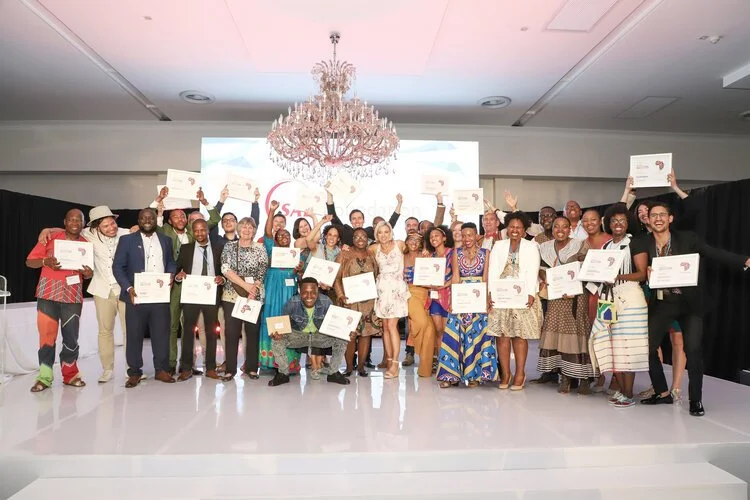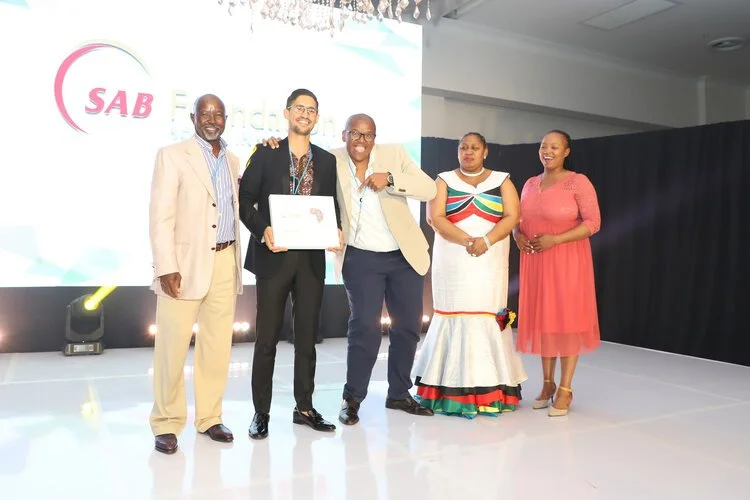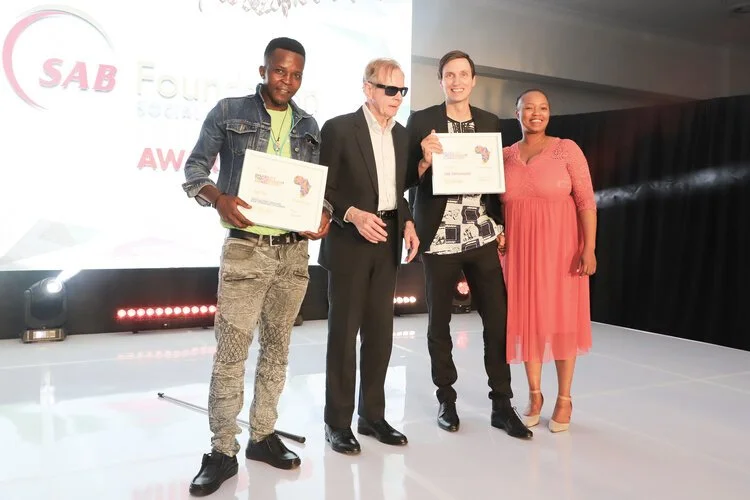Winners of the SAB Foundation Social Innovation and Disability Empowerment awards 2019 announced
The SAB Foundation Social Innovation & Disability Empowerment Awards winners at last night’s awards held in Johannesburg
A total amount of R13 650 000 in funding was awarded to twenty finalists at the Social Innovation and Disability Empowerment Awards 2019.
The R1,3-million winners are Regenize, a free recycling service with a rewards system, The OptiShunt, a device that prevents blindness in glaucoma patients and Specialised Seating for Disabled Children, custom chair and tray tables for children with physical disabilities.
Specialised Seating for Disabled Children also won the People’s Choice award voted by guests at the awards.
SOCIAL INNOVATION AWARD WINNERS
The Social Innovation Awards are aimed at innovators, entrepreneurs and institutions with prototypes or early-stage businesses that solve a social problem.
Pictured (left to right): SAB Foundation Chairman and External Trustee; Moss Ngoasheng; Regenize, Social Innovation Awards winners Chad Robertson and business partner Nkazimlo Miti; Deputy Minister of Social Development, Hendrietta Bogopane-Zulu; and SAB Foundation Social Innovation Project Manager, Ntandokazi Nodada
First place Regenize was developed by Chad Robertson and business partner Nkazimlo Miti. A free and inclusive recycling solution that rewards people for sustainable behaviours by exchanging their recycling for a virtual currency, Remali, the value of which is determined by the weight of recyclables. Remali can be used to purchase a selection of vouchers ranging from airtime to data and groceries. To drive inclusivity, Regenize partners with waste pickers during the collection process, providing them with uniforms, transport and access to sorted recyclables.
Second placed PlastiBrick receives R900 000 to further an innovation by Kekeletso Tsiloane that uses recycled plastic to manufacture stock and maxi bricks that are strong, durable, fire retardant, and environmentally friendly.
In third place is Put It Out, a mini fire extinguisher designed by Toli Altounis. It is a cost effective, non-toxic and easy to use fire extinguisher devised to curb shack fires. The R750 000 will help put the extinguisher into the hands of those who are at risk.
DISABILITY EMPOWERMENT AWARD WINNERS
The Disability Empowerment Awards are aimed at promoting social innovations that improve the quality of life for people with disabilities through assistive devices, training or employment.
Pictured (left to right): Joint first place Disability Empowerment Awards and People’s Choice awards winner, Mpho Mohlolo, developed Specialised Seating for Disabled Children; SAB Foundation External Trustee, Dr William Rowland; joint first place Disability Empowerment Awards winner, Dr Daemon McClunan with The OptiShunt; and SAB Foundation Social Innovation Project Manager, Ntandokazi Nodada
In joint first place were, Specialised Seating for Disabled Children and The OptiShunt.
Innovator, Mpho Mohlolo, developed Specialised Seating for Disabled Children. These chairs and tray tables are custom built for children with physical disabilities and are cost effective, strong and environmentally friendly.
The OptiShunt, designed by Dr Daemon McClunan, is an implantable device that prevents blindness in glaucoma patients by draining excess fluid out of the eye while equalising pressure between the eye and the optic nerve. Glaucoma, an eye disease, is most severe among people in rural areas.
“Winning the SAB Foundation Disability Empowerment Award provides us with the support we need to set the OptiShunt on a clear course to success, radically disrupt the current treatment of glaucoma and making a big impact in the fight against global blindness”, said Dr McClunan.
Third placed ShowerBath won R750 000, which will help Xelda Rohrbeck roll out the use of a device which helps care-givers bath disabled individuals. A combination of a shower and bathtub, the innovation eases the stress of a caregiver as it eliminates electro-mechanical hoists and reduces the physical strain of having caregivers manually lift the individual.
Since 2010, the SAB Foundation has identified, supported and helped to scale social innovations which demonstrate a sustainable business model while solving a critical social problem. "To date, we have committed over R77 million towards promoting social innovation and supported 162 businesses that solve social issues and provide solutions to people with disabilities. Over and above this we are proud that these businesses have also created 614 jobs,” said SAB Foundation Director, Bridgit Evans.
Scroll down for the complete list of Social Innovation and Disability Empowerment Award winners
SOCIAL INNOVATION AWARD WINNERS
First place, R1.3m - Regenize: Chad Robertson and his business partner, Nkazimlo Miti developed a free, inclusive, and rewarding service that offers individuals’ rewards in form of virtual currency based on the weight of their recyclable materials.
Second place, R900 000) - PlastiBrick: Kekeletso Tsiloane successfully prototyped the PlastiBrick, an innovation that uses recycled plastic to manufacture stock and maxi bricks that are strong, durable, fire retardant, and environmentally friendly.
Third place, R 750 000 - Put It Out - Mini Fire Extinguisher: Toli Altounis developed a cost effective, non-toxic easy to use fire extinguisher.
Development Award, R 600 000 - Vollar: Kyle Ueckermann established a digital currency incentive to uplift low income and informal settlements. Vollar provides disadvantaged individuals with a means to access essential products and services by earning Vollar incentives for bettering themselves or their communities.
Development Award, R 600 000 - Spoon Money: Nicolette Swartz, established Spoon Money with the idea of a multi-sided platform, which facilitates capital deployment to underserved communities who struggle to access the formal sector.
Development Award, R 400 000 - Street Booksellers: As part of the Denis Hurley Centre, Stuart Talbot established a programme that specialises in empowering unemployed and homeless men and women to sell second-hand books around Durban.
Development Award, R 400 000 - TANKS Coding App: Professor Jean Greyling and his student, Byron Batteson, started working on a free mobile application that makes use of puzzles and image recognition to introduce learners to coding without the use of a computer. Byron first produced it for his BSc Computer Science Honours project at Nelson Mandela University.
Development Award, R 400 000 - Spinetector Safety Costume: Sello Malinga developed a safety suit that is used to minimise the impact of injuries sustained by mineworkers, when their upper bodies are hit by heavy machinery or rocks.
Seed Grant, R 200 000 - NuNanny: Melisa Clayton Allardice established an online website that allows parents to connect, book, and pay for experienced nannies for babysitting and all kinds of childcare.
Seed Grant, R 200 000 - FundaBot: Ntombikayise Banda developed a low-cost robotic platform designed to teach learners in their home language programming and engineering skills such as mechanics and electronics.
Seed Grant, R 200 000 - Mobile Rural Technology Park: Luleka Mkuzo designed a mobile technology park equipped with multiple laptops to give learners and teachers of rural communities’ access to technology, the internet, and basic computer skills.
Seed Grant, R 200 000 - Kuba: Jacques Sibomana established software that allows small business owners to build a digital administrative track record and supplies them with supportive services that simplifies their trade with large corporate companies in and around Cape Town.
Seed Grant, R 200 000 - Moonshine Reflective Paint: Memphis Kaotsane from Taung, North West, designed reflective paint to help reduce night-time collisions between vehicles and stray animals, livestock and cyclists when a car’s headlights reflect off it.
Seed Grant, R 200 000 - Pro Se Legal: Grace Gichanga established a chatbot that provides practical and relevant legal information via chat platforms, such as WhatsApp and Facebook Messenger. Information is available 24 hours a day and is provided though text, video, audio, and images.
Seed Grant, R 200 000 - Recycled Glass Turned Countertops: Jabulani Dlamini established Recycled Glass Turned Countertops, a business that specialises in collecting, weighing, and paying waste pickers for their recycled glass and manufactures it into countertops, floor and wall tiles, and sculptures.
Seed Grant, R 200 000 - Boolyx Edu-Tech: Kutlwano Ngwarati established an online platform for university students to access more affordable textbooks and academic publications. This platform allows students unlimited access to over 400,000 textbooks for a monthly subscription.
Seed Grant, R 200 000 - NuMaths Kids App: Lungile Maile developed a mathematics mobile application with 120 games that is designed to entertain and educate children between four and seven years old.
DISABILITY EMPOWERMENT AWARD WINNERS
Joint First place, R1 300 000 - OptiShunt: Dr Daemon McClunan designed an implantable device that prevents blindness in glaucoma patients by draining excess fluid out of the eye while equalising pressure between the eye and the optic nerve.
Joint First place, R 1 300 000 - Specialised Seating for Disabled Children: Moleseng Mohlolo acted on the need for affordable and accessible chairs for disabled children. He custom made assortment of strong, low cost chairs, which are environmentally friendly as they are made from cardboard boxes, paper and glue made out of flour and water. He also won R 150 000 in the People’s Choice awards voted by guests at the awards.
Third place, R 750 000 - Showerβath: Xelda Rohrbeck was first introduced to the Showerβath, a combination of a shower and bathtub to enable easy bathing of individuals with profound intellectual and physical disabilities, who are unable to bath themselves and depend on caregivers. Lucy Slaviero designed the Showerβath, when she saw how caregivers struggled to bath particularly the elderly, with profound intellectual disabilities and limited mobility.



